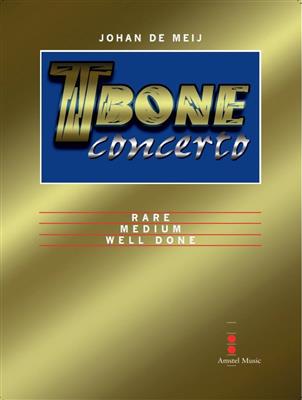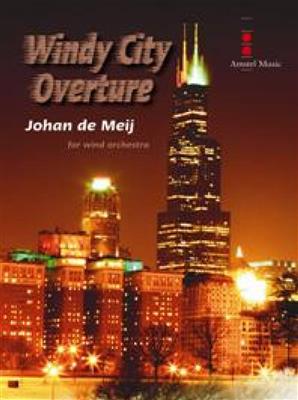Results
-
 £275.99
£275.99UFO Concerto - Johan de Meij
Ufo Concerto, the first solo work by Johan de Meij for euphonium solo, is not a traditional concert work in the classical sense. It is comprised of five movements that are thematically interconnected: Andante - Con moto , Giocoso - Vivo, Andante cantabile, Vivace, and Alla Marcia - Vivace.
Estimated dispatch 7-14 working days
-
 £149.99
£149.99Polish Christmas Music - Johan de Meij
For many centuries Poland has bosted a very rich tradition ofChristmas Carols. Some hymns belong to church music, while others definitely do have a folk music character. Johan de Meij has used both these elements in this suite. You can hear the songs: Poklon Jezusowi; Mizerna, cicha; Aniol pasterzom mwil; Gdy sliczna Panna and Jam jest dudka.
Estimated dispatch 7-14 working days
-
 £110.99
£110.99T-Bone Concerto, Part I - Rare - Johan de Meij
The T-Bone Concerto was Johan de Meij's first composition for solo instrument and symphonic band. It consists of three movements called respectively 'Rare', 'Medium' and 'Well Done'. In addition to the solo trombone, an important role has been allotted to a kind of chamber music ensemble within the band. This group introduces new thematic material and accompanies the soloist, thus creating a delightful transparant accompaniment. The ensemble consists of a double wind quintet (2 flutes, 2 oboes, 2 clarinets, 2 french horns and 2 bassoons) plus a cor anglais and a double bass. Part I is written in the A-B-A form and allow the soloist to display both the technical and the lyricalcharacteristics of the instrument.
Estimated dispatch 7-14 working days
-
£110.99
T-Bone Concerto, Part II - Medium - Johan de Meij
The T-Bone Concerto was Johan de Meij's first composition for solo instrument and symphonic band. It consists of three movements called respectively 'Rare', 'Medium' and 'Well Done'. In addition to the solo trombone, an important role has been allotted to a kind of chamber music ensemble within the band. This group introduces new thematic material and accompanies the soloist, thus creating a delightful transparant accompaniment. The ensemble consists of a double wind quintet (2 flutes, 2 oboes, 2 clarinets, 2 french horns and 2 bassoons) plus a cor anglais and a double bass. Part II is written in the A-B-A form and allow the soloist to display both the technical and the lyricalcharacteristics of the instrument. Part III at first develops into a kind of neo-baroque style using the thematic material of the first and second movement, and finally leads to a triumphant finale and a virtuoso conclusion.
Estimated dispatch 7-14 working days
-
 £110.99
£110.99T-Bone Concerto, Part III - Well Done - Johan de Meij
The T-Bone Concerto was Johan de Meij's first composition for solo instrument and symphonic band. It consists of three movements called respectively 'Rare', 'Medium' and 'Well Done'. In addition to the solo trombone, an important role has been allotted to a kind of chamber music ensemble within the band. This group introduces new thematic material and accompanies the soloist, thus creating a delightful transparant accompaniment. The ensemble consists of a double wind quintet (2 flutes, 2 oboes, 2 clarinets, 2 french horns and 2 bassoons) plus a cor anglais and a double bass. Part III at first develops into a kind of neo-baroque style using the thematic material of the first andsecond movement, and finally leads to a triumphant finale and a virtuoso conclusion.
Estimated dispatch 7-14 working days
-
 £340.99
£340.99T-Bone Concerto (Complete Edition) - Johan de Meij
The T-Bone Concerto was Johan de Meij's first composition for solo instrument and symphonic band. It consists of three movements called respectively 'Rare', 'Medium' and 'Well Done'. In addition to the solo trombone, an important role has been allotted to a kind of chamber music ensemble within the band. This group introduces new thematic material and accompanies the soloist, thus creating a delightful transparant accompaniment. The ensemble consists of a double wind quintet (2 flutes, 2 oboes, 2 clarinets, 2 french horns and 2 bassoons) plus a cor anglais and a double bass. Parts I and II are written in the A-B-A form and allow the soloist to display both the technical and thelyrical characteristics of the instrument. Part III at first develops into a kind of neo-baroque style using the thematic material of the first and second movement, and finally leads to a triumphant finale and a virtuoso conclusion.
Estimated dispatch 7-14 working days
-
 £149.99
£149.99The Red Tower - Johan de Meij
The Red Tower was inspired by the painting of the same name (La Torre Rossa) by the Italian artist Giorgio de Chirico, and was awarded first prize in the International Composition Contest in Oman. One of the towers of the mediaeval walls of the Italian town of Soncino (home to the band for whom Johan de Meij wrote the work for) shows a remarkable resemblance to the tower in the work of De Chirico.
Estimated dispatch 7-14 working days
-
 £149.99
£149.99The Lord of the Rings (Excerpts) - Johan de Meij
Johan de Meij's first symphony The Lord of the Rings, based on the famous trilogy by Tolkien, has established itself as a 'classic' piece in the concert band piece repertoire.In this edition, Paul Lavender has masterfully condensed and arranged the symphony into a practical concert version, written at a level and with instrumentation to work within the reach of most bands. This version includes optional cuts allowing several performance lengths and options which enable you to tailor your performances as appropriate. Let your audience experience a fabulous adventure!
Estimated dispatch 7-14 working days
-
 £149.99
£149.99Klezmer Classics - Johan de Meij
Klezmer is the traditional instrumental music for weddings and parties of the Yiddish speaking Jews of Eastern Europe. Its origin goes back to the sixteenth century. At this time Yiddish culture was at its peak in the countries where the Jews then lived: Poland, Ukraine, Byelorussia (White Russia), Latvia, Lithuania, Moldavia, Romania, Slovakia and Hungary. In recent years there has been a revival in popularity of this style of music and it is often played outside of its traditional context. Johan de Meij has arranged five classics from the Klezmer repertoire into a colourful selection for concert band.
Estimated dispatch 7-14 working days
-
 £129.99
£129.99Windy City Overture - Johan de Meij
Chicago, America's third largest city, is characterised by its modernskyline with dazzling architecture, fabulous restaurants and swingingjazz clubs. It is also, however, famous for its bitterly cold wind whichblows in from Lake Michigan and gives the city its nickname "TheWindy City". With Windy City Overture, Johan de Meij has produced ashort, rich energetic work, which represents the spirit and the powerof this exciting city.
Estimated dispatch 7-14 working days
